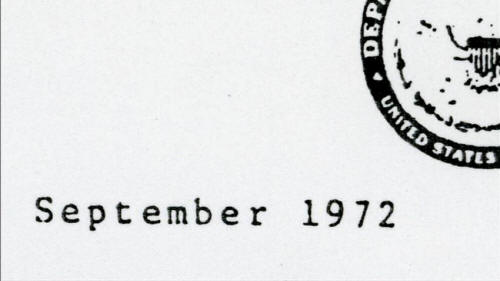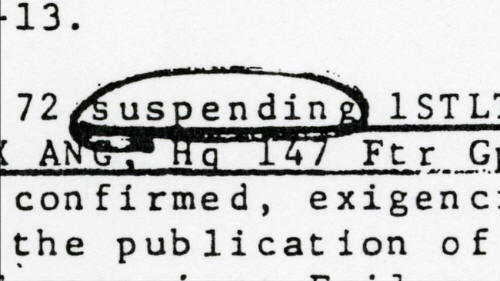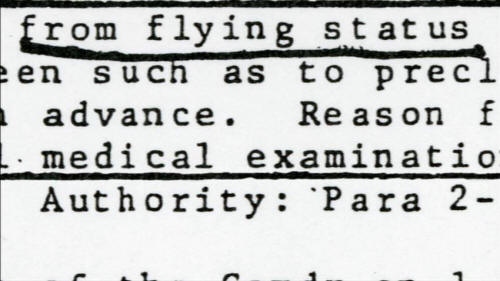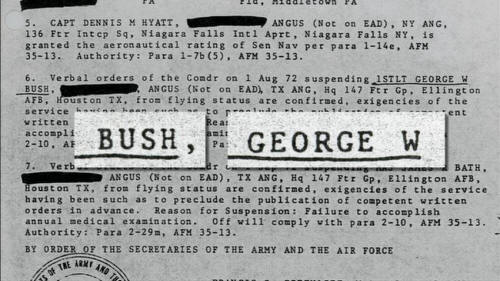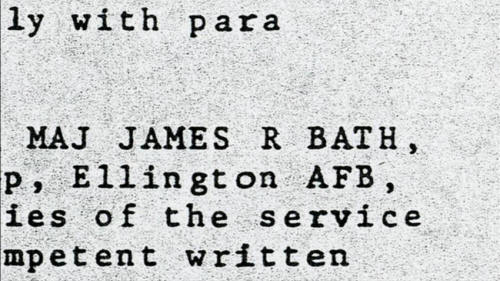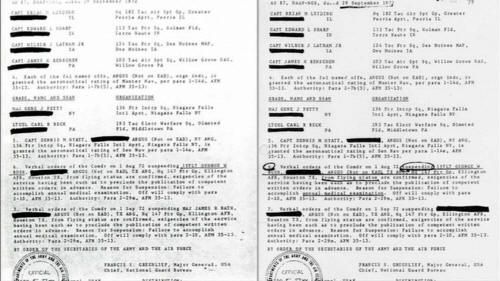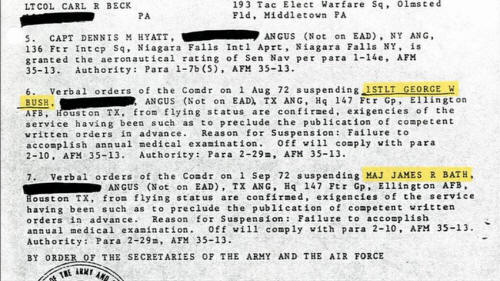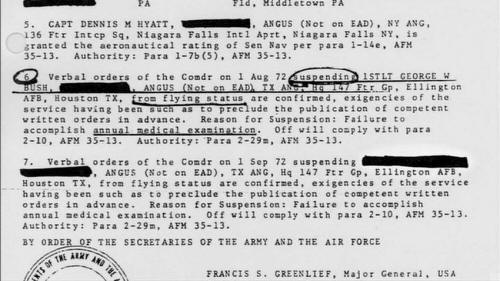|
FAHRENHEIT 9/11 -- ILLUSTRATED SCREENPLAY & SCREENCAP GALLERY |
|
In 1972, two airmen were suspended for failing to take their medical examination. One was George W. Bush. And the other was James R. Bath. In 2000, the documents show both names. But in 2004, Bush and the White House had Bath's name blacked out. Why didn't Bush want the press and the public to see Bath's name on his military records? Perhaps he was worried that the American people would find out that at one time, James R. Bath was the Texas money manager for the bin Ladens. _____________ America Betrayed, by Rhawn Joseph, Ph.D. wrote: BUSH-LADENS With the election of Jimmy Carter, in 1976, George H. W. Bush (the director of the CIA) would soon be out of a job. George H. W. Bush, immediately began scouring the country, and other nations, for financial and other support, as he intended to run for the presidency in 1980. That same year (1976), CIA director Bush personally recruited James R. Bath into the CIA (21). According to Bath business associate Charles W. "Bill" White: "Bath told me that he was in the CIA. He told me he was recruited by George H. W. Bush himself in 1976." James R. Bath, CIA operative, and friend of the Bush family, "was named a trustee for Sheik Salem bin Laden of Saudi Arabia. Bath's job was to handle all of bin Laden's North American investments and operations" (22). James Bath also had the good fortune to become the representative of yet another rich and influential Saudi family, that of Khalid bin Mahfouz, the brother-in-law of Osama bin Laden (23). Investing in the family of a man who might soon be president, made good business sense to the bin Ladens and other Saudis, and James R. Bath, invested $50,000 in the younger Bush's first company, Arbusto Energy, even though it was nearly bankrupt with no hope of making a buck (23,24). These and other funds were provided by the bin Ladens and the Mahfouz families. Indeed, "most of Bath's investments were really fronts for Mahfouz and other Saudis connected with the Bank of Credit and Commerce (BCCI)" (24) as well as the bin Ladens (22). James R. Bath was well connected to and trusted by the Bush family, having served not only as a CIA-operative, but in the Texas Air National Guard with George W. Bush (23). This friendship was apparently maintained during those periods when George W. was constantly drunk, snorting cocaine, as well as AWOL from his unit (25). Over the next two decades the Bush family would continue to sell themselves to the Saudis and bin Ladens. Indeed, once he became vice-president and then President, an assortment of Saudi terrorists, crooks, gangsters and murderers eagerly lined up to buy influence and to invest in the Bush family during the 1980s and beyond (21-25,26). For example, Bin Laden brother-in-law, Sheik Mahfouz, the NCB banker for Saudi billionaire financier Abdullah Bakhsh (and David Edwards -- a close friend of Bill Clinton who was also representing Bakhsh's U.S. interests), arranged for Bakhsh to purchase 17% of another Bush company, Harken Energy, in 1987 (26). Harken was struggling with debt, and like Arbusto before it, was in danger of going bankrupt. Bush, in a deal that has been described as classic, illegal, "insider trading," dumped most of his stock before it tanked (27). Bush, and his Harken Energy company were desperately in need of cash, and the Saudis stepped up to the plate and pitched him $25 million (26). Talet Othman, a Palestinian representative of Bakhsh was also given a seat on Harken's board of directors whose members included George W. Bush -- the son of vice president, soon to be President George H. W. Bush. It was soon thereafter that George W. Bush's nearly bankrupt Harken Energy, was given a drilling contract with Bahrain. Money began pouring in (25,26). The Saudis bought not only board membership, but a seat at President George H. W. Bush's White House foreign policy table (23,26). In exchange for bailing out his son, George H. W. Bush also sold these men the right to help determine U.S. foreign policy. In 1990, Othman, acting as a representative of Mahfouz, Bakhsh, and the Saudi royal family, along with 15 other Saudis, began attending White House meetings with President George H. W. Bush and National Security Advisor Brent Scowcroft, to discuss not only Middle East policy, but Iraq (23,25). Three of these meetings took place during the period just before and after Iraq invaded Kuwait.
|
